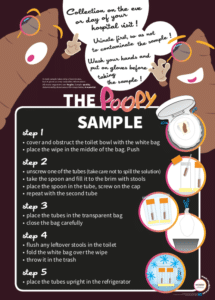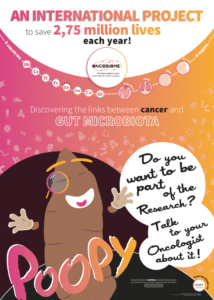Microbiota
Download the ONCOBIOME communication kit !
MICROBIOTA BROCHURE
Discover what the microbiota is and how it can be linked to cancer
STOOL COLLECTION BROCHURE & POSTER
Find out more about the stool collection steps
ONCOBIOME POSTER
Discover the Microbiota in video
Our gut microbiome or flora contains tens of trillions of microorganisms, including bacteria, viruses, and fungi [1, 2]. The microbiome composition, like a signature or fingerprint, is unique to each individual, and depends on diet, environment, medication, and a person’s age [2, 3]. The gut microbiome has several essential functions, such as digestion, producing vitamins, as well as playing a vital role in immunity [4].
Now, research is linking changes in the gut microbiome to cancer and an altered immune response [3] [5, 6]. Several mechanisms may be involved, including inflammation and other hallmarks of cancer [7, 8]. We know that certain microorganisms can predispose individuals to cancer, such as Helicobacter pylori, a bacterium which the World Health Organisation (WHO) classifies as a class I cancer-causing agent as it is associated with stomach cancer [9-11]. In the last few years, other bacteria – present in our gut microbiome – have been associated with cancer development. For example, more Fusobacterium nucleatum were found in colon cancers compared to healthy colon tissues [12-14]. These increased levels are associated with more advanced cancers and shorter life expectancies [15].
Our microbiota is not only associated with cancer development but also with the effectiveness of cancer treatment [1, 3, 6]. We know that chemotherapy and antibiotics alter the gut microbiome [1] and that patients with a favourable gut microbiota signature respond better to certain treatments [1, 3, 16].
With today’s technology, we can study the complex interactions between the gut microbiome, cancer, and cancer treatment.
ONCOBIOME is an international collaboration, coordinated by Gustave Roussy and funded by the European Union (Horizon 2020). Through this collaboration, we hope to identify and validate microbiome signatures (i.e. a combination of bacteria species) which will predict if someone will develop a cancer, what will be the severity of the disease and if the treatment be effective and safe. The discovery of these microbiome signatures will lead to the development of diagnostic tools for prediction, but also to the identification and isolation of bacteria. Once isolated, we will investigate how these bacteria impact the outcome of cancer development and treatment with the aim to develop bacteria-based preventative therapy.
- Zitvogel, L., et al., The microbiome in cancer immunotherapy: Diagnostic tools and therapeutic strategies. Science, 2018. 359(6382): p. 1366-1370.
- Barko, P.C., et al., The Gastrointestinal Microbiome: A Review. J Vet Intern Med, 2018. 32(1): p. 9-25.
- Helmink, B.A., et al., The microbiome, cancer, and cancer therapy. Nat Med, 2019. 25(3): p. 377-388.
- Yang, A.L. and P.C. Kashyap, A clinical primer of the role of gut microbiome in health and disease. Trop Gastroenterol, 2015. 36(1): p. 1-13.
- Bhatt, A.P., M.R. Redinbo, and S.J. Bultman, The role of the microbiome in cancer development and therapy. CA Cancer J Clin, 2017. 67(4): p. 326-344.
- Chen, J., et al., The microbiome and breast cancer: a review. Breast Cancer Res Treat, 2019.
- Fulbright, L.E., M. Ellermann, and J.C. Arthur, The microbiome and the hallmarks of cancer. PLoS Pathog, 2017. 13(9): p. e1006480.
- Hanahan, D. and R.A. Weinberg, Hallmarks of cancer: the next generation. Cell, 2011. 144(5): p. 646-74.
- Meucci, G., et al., High prevalence of Helicobacter pylori infection in patients with colonic adenomas and carcinomas. J Clin Gastroenterol, 1997. 25(4): p. 605-7.
- Ishaq, S. and L. Nunn, Helicobacter pylori and gastric cancer: a state of the art review. Gastroenterol Hepatol Bed Bench, 2015. 8(Suppl 1): p. S6-s14.
- Wang, F., et al., Helicobacter pylori-induced gastric inflammation and gastric cancer. Cancer Lett, 2014. 345(2): p. 196-202.
- Bullman, S., et al., Analysis of Fusobacterium persistence and antibiotic response in colorectal cancer. Science, 2017. 358(6369): p. 1443-1448.
- Kostic, A.D., et al., Genomic analysis identifies association of Fusobacterium with colorectal carcinoma. Genome Res, 2012. 22(2): p. 292-8.
- Castellarin, M., et al., Fusobacterium nucleatum infection is prevalent in human colorectal carcinoma. Genome Res, 2012. 22(2): p. 299-306.
- Flanagan, L., et al., Fusobacterium nucleatum associates with stages of colorectal neoplasia development, colorectal cancer and disease outcome. Eur J Clin Microbiol Infect Dis, 2014. 33(8): p. 1381-90.
- Strouse, C., A. Mangalam, and J. Zhang, Bugs in the system: bringing the human microbiome to bear in cancer immunotherapy. Gut Microbes, 2019. 10(2): p. 109-112.





